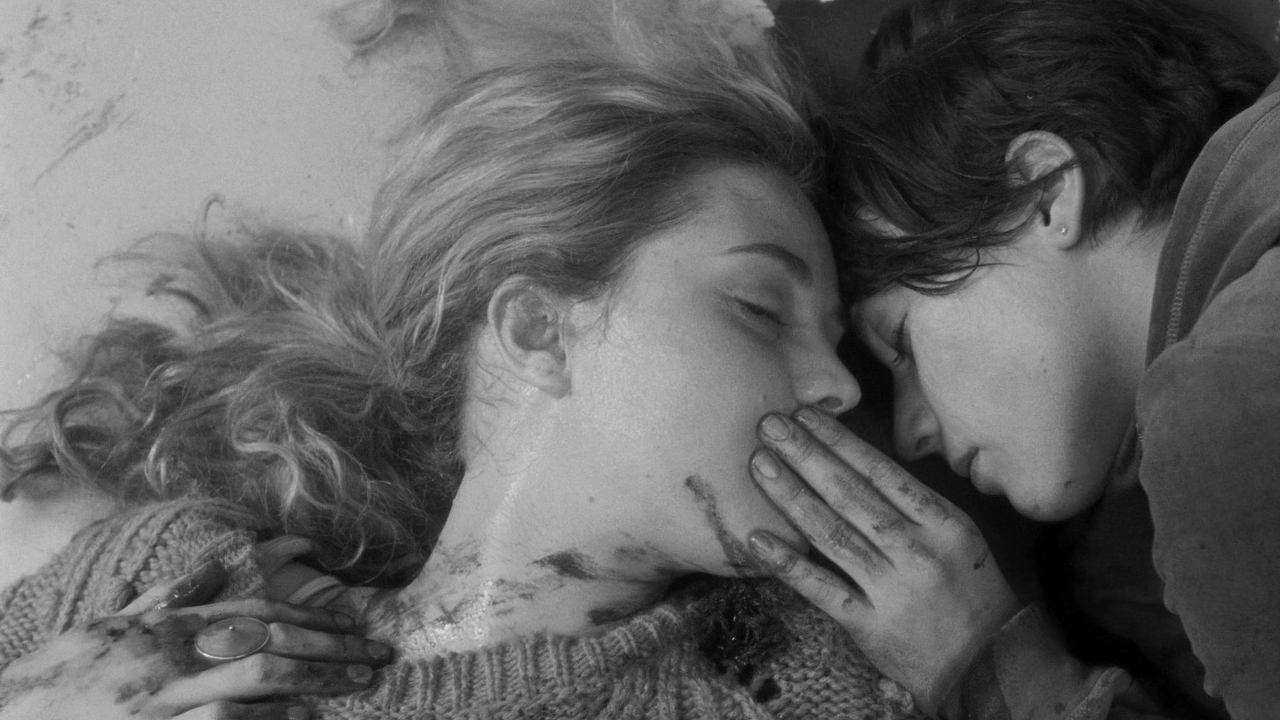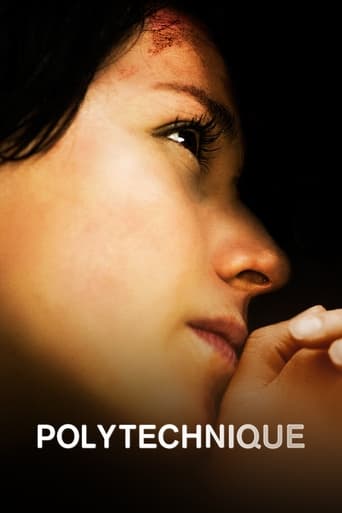

Truly Dreadful Film
... View MoreToo many fans seem to be blown away
... View MoreI cannot think of one single thing that I would change about this film. The acting is incomparable, the directing deft, and the writing poignantly brilliant.
... View MoreThe storyline feels a little thin and moth-eaten in parts but this sequel is plenty of fun.
... View MoreIt is difficult to be able to speak/write about films like this that cover events to say the least dramatic and, given the indelible mark they leave in global history but especially the place where they occurred, important. Because if misunderstood you risk appearing disrespectful to those who have passed through their skin those certain tragic events; and the same is true for those who make them. However, after this premise, I will try to review this "Polytechnique", a film that had all the potential to be an unforgettable masterpiece but that is content to undoubtedly be a good film without excelling and exploiting all its potential. Definitely Villeneuve as a director does an excellent job that confirms once again his great skills that will then find their maximum splendor in his subsequent films, such as "Arrival", "Blade Runner 2049" and "Sicario"; with excellent shots and beautiful long shots, his direction proves to be mature, conscious and very clear, the black and white, here really beautiful, is then a touch of class. Needless to say, the film hits and excites, especially in the scenes in which the massacre takes place, with images, implicit and explicit, strong and difficult to absorb. We must admit, however, with the maximum respect possible, that a film with a true story of this type and this importance to the shoulders, can easily moves. It seems that this was also understood by Villeneuve himself and the writers that for the rest of the film, so all that comes before and after the massacre and not during, treat every aspect superficially, also because of an excessively short duration. A film that then leaves too little space and time to the true emotions of the characters, before and after the fact, and that then analyzes and explores the psychological aspect of the event in a too hastily way. The same figure of the murderer is not analyzed and characterized satisfactorily; his motivations, his person / figure, what made him get up to that point and that turned him into a killer, all this is addressed in a way that does not convince enough or while some of these aspects is not really considered . The same applies to the other protagonists of the film, they are very poorly characterized and this makes it impossible to identify with them the psychological impact suffered both during the massacre and afterwards too superficially. Very good, however, the melancholic soundtrack that seeks, together with the images, to create an intense and suggestive atmosphere, in this we say that it manages however remains an atmosphere too thin, easy to break, in fact we are easily distracted, and not manages to remain constant or incisive enough to remain even after the end of the film. Also for this reason the film, although objectively of excellent quality, at least technical, is too superficial and short, which makes it weak and easy to forget. Too bad because it could be a true masterpiece.
... View MoreIn December 6, 1989, disgruntled 25-year-old student Marc Lépine shoot 28 people and then killed himself in École Polytechnique in Montreal. He aims his anger at feminists and blames his failures on them. This is a dramatized version of the true events. Maxim Gaudette plays the unnamed killer. Valérie (Karine Vanasse), Stéphanie (Evelyne Brochu) and Jean-François (Sébastien Huberdeau) are fellow mechanical engineering students and friends. The film follows these four characters before, during and after the incident.Director Denis Villeneuve shots this in black and white. It gives a cold feel to the movie. I think the killer's writing is chilling but the minutia of the fellow students' lives are boring. The only exception is the interview for the internship. The black and white is quite effective during the shooting incident. There are a lot of comparison to Gus Van Sant's Elephant. The main difference for me is that this is a real incident. I almost never call for a strict reenactment but this needs that kind of detail. I would prefer that the 20 minutes shooting spree be recreated perfectly.
... View MoreThe 2nd film by Villeneuve I've so far seen, and he's already one of my favourite film makers. And, judging the reviews, he also divides. Some of the negative reviews complain about the film makers' choice to basing the film on actual events while fictionalizing it on purpose. And I'm a little lost about that, I'm not sure whether it's the choice or in fact this disclaimer that meets this discontent - in other words whether anything would be different had the reviewers in question missed the disclaimer. What is fiction, what reality indeed, to quote one of the other reviewers. As soon as you touch a subject, be it in writing or as a film, you fictionalize it - to a degree it even goes that way with documentaries (and it begins with memories). This makes the choice of the film makers a rather smart one - if you know nothing about the Montreal shooting, actually if you do, but weren't there, the difference is almost incidental. What we're left with is one shooting and its effects for many others. Does this choice make the film unrealistic? Far from it. Unless you consider a, say, McEwan novel as unrealistic and exploiting for being fiction while putting the plot into a context of real events. Whether the choice is made out of respect for the victims is also irrelevant for the viewer. For the viewer contents-format relation is decisive. And what we see is uncommented on matter-of-factly depiction that keeps an unusual balance between the graphic (not in the sense of the usual graphic detail, but rather of graphic impact) and the subtle, the restrained. It says, This is what a shooting is. Full stop. The effect on the survivors is told in equally un-elaborated form. It never fully enters either the victims' nor the perp's total POV beyond this constraint, which is smart again; otherwise it'd be inevitable to cross the border to the sentimental, which I always find insulting towards the victims. Instead we're watching jumps between the significant moments both of the shooting and the later effects on the traumatized, only where necessary, and without distorting embellishment. The film begins with a letter composed by the shooter, which he's about to carry on his person, to be found by the world to read in the aftermath. The film makers do not allow him this fame within the frame of the film. Although the film begins with him, and although he necessarily prominent he is denied the higher significance he seeks on the whole, his end as incidental in comparison; he remains nameless. It ends with another letter, from a survivor to the shooter's parents, beginning with her saying that she knows that this letter will not be read (presumably because it's meant to stay with her). Which is the one that stays with us. This is the closest the writer & director go. And they let it end right there. Perhaps it's not the best way to turn a review into a rebuttal, but these points highlight what I liked about the film. The film makers stood before the same questions as the reviewers, they made a conscious choice, and it was the right one. To me this is one of the most tactful treatments of the subject of shootings, while bringing us right there, and it does so without the burden of artificial sentiment, making the impact an even stronger one.
... View MoreOn December 6, 1989, Marc Lepine wrapped his Ruger Mini-14 semi automatic rifle in a plastic garbage bag, filled the pockets of his coat with ammunition, and headed off to class at the Montreal's Ecole Polytechnique, the engineering branch of the University of Montreal. By the time he was through, fourteen women lay dead, and another ten women and four men were in critical condition. Lepine culminated his misogynistic rampage and wretched existence with a bullet to his head, leaving behind a rambling three page letter railing against feminists who had turned society against him and ruined his life and everything good that had been created by man.Even today the magnitude of the tragedy runs deep in Montreal's collective psyche, and its into this minefield that the film Polytechnique dares to tread, stirring strong sentiments from the public and critics alike for recounting an event whose wounds still live in the consciousness of victims families and survivors.Filmed in stark black and white, and shot twice, once in French and again in English using the same cast, Director Denis Villeneuve imbues the film with an almost suffocating foreboding as a pallor of death hangs over the day like the snow that gently falls throughout. Rather than dwell on Lepine, he instead shifts the focus to two fictional students, Valérie (Karine Vanasse) and Jean-François (Sébastien Huberdeau), each bringing the perspective of their respective gender to the story.By framing events through the lives of these two, Polytechnique packs a most powerful punch. With the exception of a bone chilling beginning, Lepine's murderous rampage virtually plays second fiddle to the story of Valérie and Jean-François, which is how Villeneuve wanted it. He studiously avoids dwelling on death, and shifts the film's emphasis to that of life, grappling with tragedy head on, and the aftermath of anguish that exploded that day like so many bullets from Lepine's gun.This isn't some sensationalist gory ode to a mass murderer, but rather a memorial to the victims of that day. It's not that often you see that in a movie, which makes watching Polytechnique an act of remembrance, and a cause to reflect.
... View More